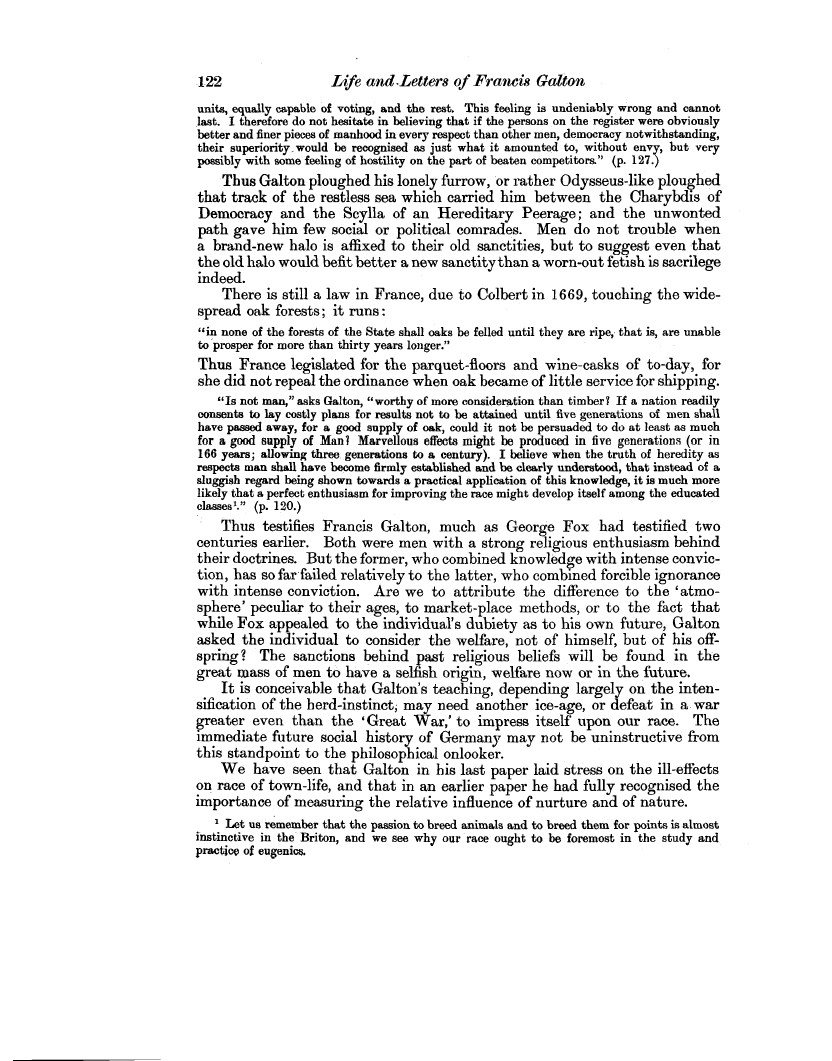122 Life and Letters of Francis Galton
units, equally capable of voting, and the rest. This feeling is undeniably wrong and cannot last. I therefore do not hesitate in believing that if the persons on the register were obviously better and finer pieces of manhood in every respect than other men, democracy notwithstanding, their superiority, would be recognised as just what it amounted to, without envy, but very
possibly with some feeling of hostility on the part of beaten competitors." (p. 127.)
Thus Galton ploughed his lonely furrow, or rather Odysseus-like ploughed that track of the restless sea which carried him between the Charybdis of Democracy and the Scylla of an Hereditary Peerage ; and the unwonted path gave him few social or political comrades. Men do not trouble when a brand-new halo is affixed to their old sanctities, but to suggest even that the old halo would befit better a new sanctity than a worn-out fetish is sacrilege indeed.
There is still a law in France, due to Colbert in 1669, touching the widespread oak forests ; it runs
"in none of the forests of the State shall oaks be felled until they are ripe, that is, are unable to prosper for more than thirty years longer."
Thus France legislated for the parquet-floors and wine-casks of to-day, for she did not repeal the ordinance when oak became of little service for shipping.
"Is not man," asks Galton, "worthy of more consideration than timber? If a nation readily consents to lay costly plans for results not to be attained until five generations of men shall have passed away, for a good supply of oak, could it not be persuaded to do at least as much for a good supply of Man? Marvellous effects might be produced in five generations (or in 166 years; allowing three generations to a century). I believe when the truth of heredity as respects man shall have become firmly established and be clearly understood, that instead of a sluggish regard being shown towards a practical application of this knowledge, it is much more likely that a perfect enthusiasm for improving the race might develop itself among the educated
classes'." (p. 120.)
Thus testifies Francis Galton, much as George Fox had testified two centuries earlier. Both were men with a strong religious enthusiasm behind their doctrines. But the former, who combined knowledge with intense conviction, has so far failed relatively to the latter, who combined forcible ignorance with intense conviction. Are we to attribute the difference to the 'atmosphere' peculiar to their ages, to market-place methods, or to the fact that while Fox appealed to the individual's dubiety as to his own future, Galton asked the individual to consider the welfare, not of himself, but of his offspring? The sanctions behind past religious beliefs will be found in the great mass of men to have a selfish origin, welfare now or in the future.
It is conceivable that Galton's teaching, depending largely on the intensification of the herd-instinct, may need another ice-age, or defeat in a war greater even than the `Great War,' to impress itself upon our race. The immediate future social history of Germany may not be uninstructive from this standpoint to the philosophical onlooker.
We have seen that Galton in his last paper laid stress on the ill-effects on race of town-life, and that in an earlier paper he had fully recognised the importance of measuring the relative influence of nurture and of nature.
' Let us remember that the passion to breed animals and to breed them for points is almost instinctive in the Briton, and we see why our race ought to be foremost in the study and practice of eugenics.

